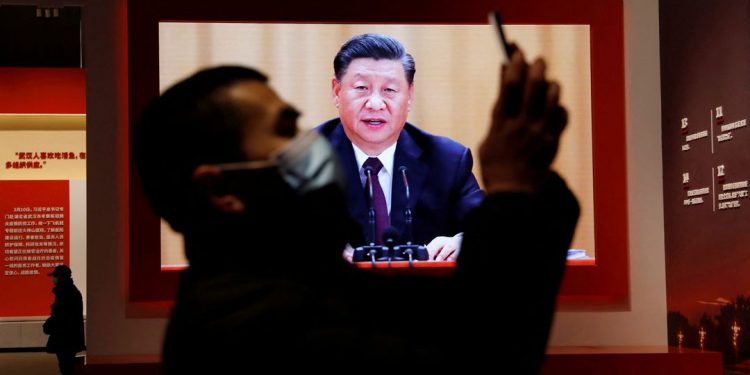Until fairly recently, Chinese President Xi Jinping touted his zero-COVID policy as proof that authoritarian one-party states like China are better equipped to deal with pandemics (or any other crisis) than messy democracies hampered by selfish politicians and fickle electorates.
This might have seemed plausible to many in 2020, when hundreds of thousands of Americans were dying and former US President Donald Trump was touting anti-malaria drugs and bleach injections as COVID-19 remedies. Meanwhile, Xi enforced rigid pandemic restrictions that almost shut down the entire country, forced people into isolation camps, and insisted that Chinese citizens travelling abroad wear hazmat suits, like workers in some giant toxic laboratory. For a while, this strict regime appeared to keep COVID deaths to a minimum, compared to most other countries (though Chinese government statistics are notoriously unreliable).
But the high economic costs of China’s zero-COVID strategy drove people to such despair that some finally took to the streets, at great risk. Still, Xi continued to claim that the ruling Communist Party was waging a “people’s war” against the virus and would do whatever it takes to save lives. Then, at the end of last year, when protests erupted across Chinese cities, the war was suddenly declared over. No more lockdowns, hazmat suits, or even regular PCR tests. Following last year’s unprecedented protests, it appears that China now deems COVID-19 harmless.
But as a result of Xi’s volte-face, together with the poor quality of Chinese-made vaccines and China’s low vaccination rate, nearly 9,000 Chinese people are probably dying every day, and 18.6 million across the country have reportedly been infected since zero-COVID restrictions were lifted in early December. And things could easily get much worse.
These developments suggest that Indian economist Amartya Sen was correct when he famously argued in 1983 that famines are caused not only by a shortage of food but also by a lack of information and political accountability. For example, the Bengal famine of 1943, India’s worst, happened under imperial British rule. After India gained independence, the country’s free press and democratic government prevented similar catastrophes. Sen’s thesis has since been hailed as a ringing endorsement of democracy. While some critics have noted that elected governments can also cause considerable harm, including widespread hunger, Sen points out that no famine has “ever taken place in a functioning democracy.”
China’s system of one-party, and increasingly one-man, rule is couched in Communist or nationalist jargon, but is rooted in fascist theory. The German jurist Carl Schmitt, who justified Adolf Hitler’s right to wield total power, coined the term “decisionism” to describe a system in which the validity of policies and laws is not determined by their content but by an omnipotent leader’s will. In other words, Hitler’s will was the law. Decisionism is aimed at eliminating class conflict, factional strife, and pesky political opposition. The will of the people, often expressed through a rigged plebiscite, is carried out by the leader who decides in the people’s name.
Autocratic centralisation can indeed have some advantages. Top-down decisions, often implemented by competent technocrats, have enabled China to build high-speed railways, fancy highways, excellent airports (even remote ones are modern marvels compared to New York City’s JFK or most other major airports in the United States), and even entire cities in a matter of years. When the Party is always right, obstacles such as public opinion or parliamentary debate cannot stand in its way.
But when an actual crisis strikes – earthquakes, pandemics, and so on – the vulnerability of decisionist rule is exposed. That is why autocratic rulers need to hide or embellish statistics and silence critics like Wuhan-based doctor Li Wenliang, who first reported the COVID-19 threat in 2019 and was publicly rebuked for “spreading false rumors,” before dying of the disease in early 2020. Whatever they do, absolute rulers and the parties they lead cannot be proven wrong.
In the US, by contrast, expert opinion, critical media, and the risk of losing the 2020 presidential election forced even the blundering Trump to channel vast amounts of money into vaccine research and development. Despite many mistakes along the way and perverse obstruction by demagogues and conspiracy-mongers, the democratic response to the pandemic followed Sen’s playbook: the press and the public carefully scrutinised official statistics, most people were vaccinated, and the US, along with other Western democracies, gradually opened up, enabling people to go about their business in relative safety.
Even without Xi’s absolutist aspirations, this would have been hard to achieve in China. To justify its monopoly on power, the Communist Party has had to maintain a façade of infallibility, making it impossible to condemn the most colossal mistakes, even in retrospect. The nationwide famine of the 1950s is still often blamed on bad weather and natural disasters rather than Mao Zedong’s catastrophic Great Leap Forward. Even as at least 30 million Chinese died, officials remained silent, fearing that annoying the Great Helmsman with bad news might cost them their lives as well.
China, of course, is no longer as isolated as it was in the 1950s, Xi is not Mao, and his erratic decision-making will most likely not claim 30 million lives. But with a daily death toll of 9,000, the costs will be massive. And precisely because China is no longer isolated, the implications will extend far beyond Chinese borders. Viruses, after all, travel, as do economic disruptions. The damage done to China by its autocratic regime will end up hurting us all.
The writer is the author, most recently, of The Churchill Complex: The Curse of Being Special, From Winston and FDR to Trump and Brexit. ©Project Syndicate






































